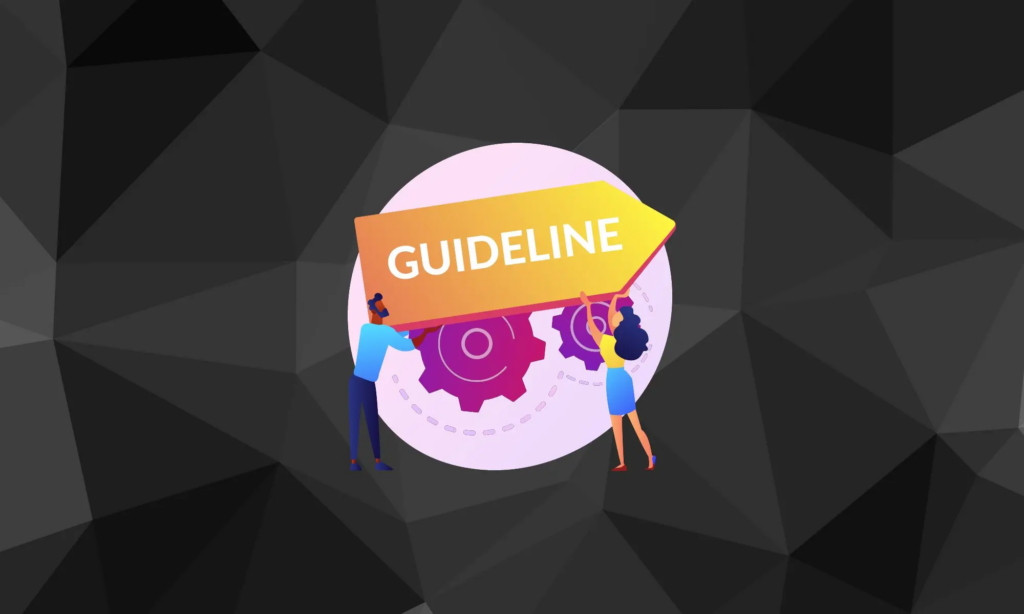
In every business landscape, navigating the complex web of regulatory requirements, internal policies, and ethical obligations is critical. The compliance coordinator is the key to all of that.
Operating behind the scenes, these individuals strive to maintain the business’s integrity by ensuring adherence to all essential rules and standards. This comprehensive guide will explore the world of compliance coordinators and their roles, responsibilities, and impact within a business.
Whether you’re considering a career in this field or seeking to understand how such a role benefits your business, this piece will serve as an insightful guide.
What is a Compliance Coordinator?
A representative from TrustNet Inc., a compliance services company, says:
“The Compliance Coordinator or Compliance Officer ensures the business adheres to all internal and external rules, standards, procedures, and regulations that apply to the business operations.
Some of their key responsibilities include those related to GRC (Governance, Risk, and Compliance), developing and implementing compliance programs, assisting in audits, reporting non-compliance issues, and training staff on compliance matters or subjects.”
A compliance coordinator plays a crucial role in promoting ethical and proper business practices by implementing effective compliance programs.
Compliance Coordinator Role Overview
Compliance Coordinator Role Overview.jpg
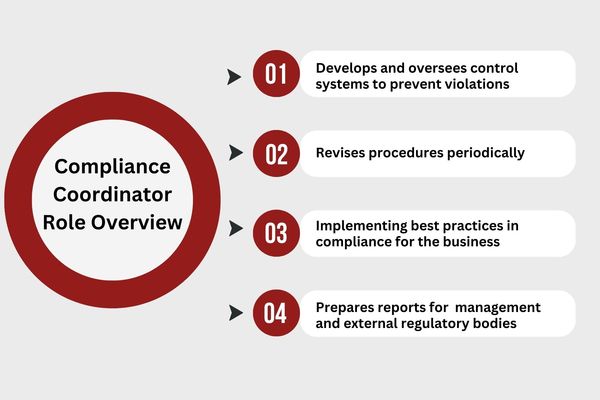
A compliance coordinator’s role may vary based on the industry and the size of the business. However, the essence of their job remains the same – to ensure that a business complies with all rules and regulations that apply to its operations.
Brenda Bernal, VP of product Security and Compliance at security company DigiCert says a compliance coordinator typically has the following roles:
“1. Identifying, addressing and helping mitigate risks for an organization through examination of an organization’s internal control environment. 2. Addressing compliance risks and exposures through risk treatment strategies. 3. Developing and integrating tools to enhance the scalability of compliance risk mitigation measures. 4. Assessing and reporting on compliance for new products, systems and processes. 5. Evaluating changes in the industry standards and regulatory landscape and ensuring those changes are understood by control and system owners to make the appropriate adjustments for compliance. 6. Interfacing with auditors, regulators and examiners during certification or audit activities. 7. Providing reports to Management and/or Risk/Audit Committees, as needed (on above activities).”
In essence, a compliance coordinator plays a key role in maintaining the integrity and ethical standing of a business.
Want to hire an effective yet cost-effective compliance coordinator? Get in touch for a free consultation.
Compliance Coordinator Job Description
The job description for a compliance coordinator can vary significantly based on the industry and the size of the business.
Role Summary:
The Compliance Coordinator assists in developing and enforcing internal regulations, working across departments to ensure company procedures align with regulatory standards for corporate compliance.
Key Responsibilities:
Developing and implementing compliance programs
Assisting in audits
Training staff on compliance matters
Reporting non-compliance issues
Qualifications and Skills:
Bachelor’s degree in a related field
3+ years of relevant work experience
Strong analytical and communication skills
Work Environment:
Typical office hours and the potential for overtime during audit periods.
Jobs Related to Compliance Coordinator
Jobs Related to Compliance Coordinator.jpg
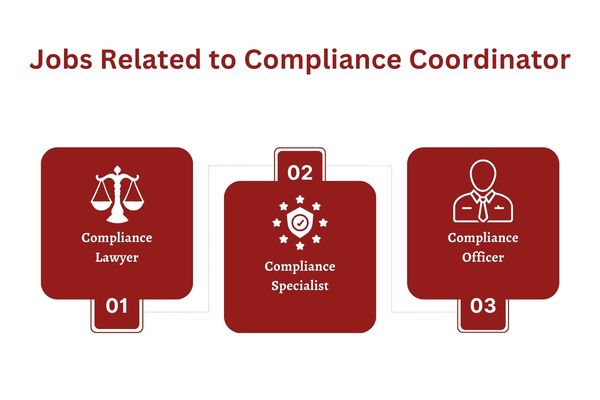
The field of compliance is essential in maintaining the legality and ethicality of a business’s operations. These professionals are critical in navigating complex compliance regulations, implementing company policies, and ensuring adherence to industry standards.
Here are the several roles that are closely related to the position of a compliance coordinator, including:
Compliance Lawyer
A compliance lawyer specializes in advising businesses on the legal and regulatory requirements that pertain to their specific industry. They interpret compliance requirements, assist with policy development, and ensure the business meets all legal requirements.
Compliance Specialist
A compliance specialist works closely with the compliance coordinator to ensure that all departments of a business are adhering to set policies and regulations. They perform regular audits and implement corrective actions where necessary.
Compliance Officer
A compliance officer, similar to a compliance coordinator, ensures that the company complies with its outside regulatory requirements and internal policies. However, a compliance officer often holds a more senior position within the business.
Pros & Cons Of Being a Compliance Coordinator
Pros & Cons Of Being a Compliance Coordinator.jpg
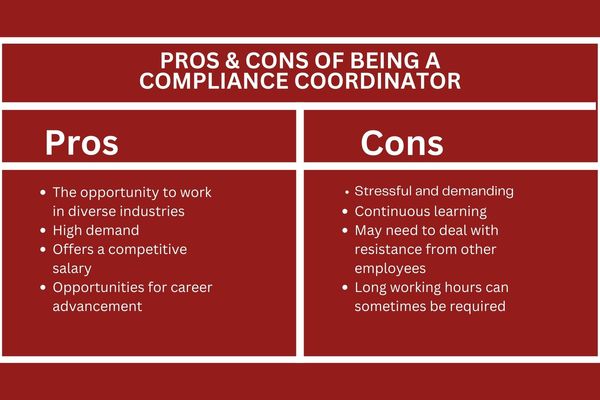
Being a compliance coordinator is a multifaceted role that comes with its own set of advantages and challenges. It is important to carefully consider the pros and cons before pursuing a career in this field.
Here, we’ll explore the various pros and cons of being a compliance coordinator:
Pros
The opportunity to work in diverse industries – potentially appealing to those seeking variety in their career.
High demand – this provides job security.
Offers a competitive salary – this will provide financial security
Opportunities for career advancement – clear paths to more senior roles like a compliance officer
Cons
Stressful and demanding – stressful, particularly in highly regulated industries.
Continuous learning – ever-changing regulations and laws require continuous reviewal of all new and updated regulations.
May need to deal with resistance from other employees – some employees might see compliance as a hindrance to their work.
Long working hours can sometimes be required – this is particularly true when new regulations are released or audits are due.
How to be a Compliance Coordinator
How to be a Compliance Coordinator.jpg
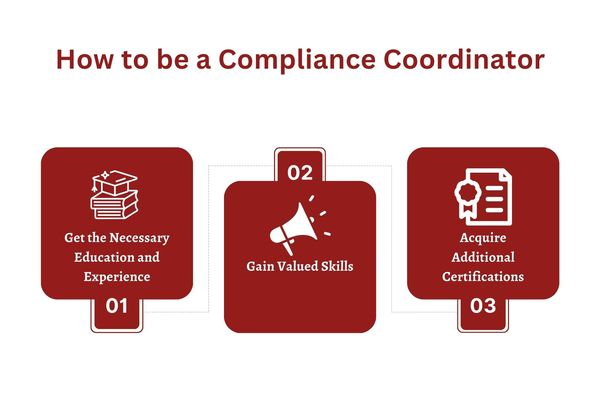
If you are interested in pursuing a career as a compliance coordinator, it is important to understand the necessary steps and qualifications. Becoming a compliance coordinator requires a combination of education, skills, and experience.
Here is a brief run-through of how to be a compliance coordinator:
Get the Necessary Education and Experience
Most businesses require their compliance coordinators to have a bachelor’s degree in business or a related field. They also typically require a few years of experience in compliance, legal, or business operations roles.
Gain Valued Skills
Excellent problem-solving skills, an analytical mindset, strong attention to detail, and a deep understanding of legal and regulatory obligations are all critical skills for a compliance coordinator.
Acquire Additional Certifications
Certification is only sometimes required but can make a candidate more attractive to potential employers. The Compliance Certification Board offers several certifications in the field.
Once all these are finished, you simply have to apply to job boards and set up a job alert to be notified whenever there is a compliance coordinator job posting.
What is a Compliance Coordinator’s Salary?
What is a Compliance Coordinator’s Salary.jpg

The salary for a compliance coordinator can vary significantly depending on the industry, the size of the company, and the individual’s experience and qualifications.
However, the salary for compliance coordinator jobs generally ranges from $47,500 to $85,000. Higher salaries are usually offered in more heavily regulated industries, larger corporations, and certain states.
Want a more affordable and effective alternative to an in-house compliance coordinator? Get in touch for a free consultation on how Captain Compliance can help you.
FAQs
How do I become a good compliance coordinator?
To become a good compliance coordinator, you need to develop strong organizational and analytical skills that help identify and manage potential compliance violations within an organization. Gain relevant educational qualifications, including degrees or certifications in fields like law or business management, which can provide the needed foundation for this role. Acquaint yourself with the requirements of different regulatory bodies affecting your industry – staying updated on changes is crucial as it helps maintain the legal integrity of the company. Building effective communication skills is also needed because you will be coordinating between various departments.
Want to become a compliance lawyer instead? Click here to find out how.
Do Compliance Coordinators Need a Specific Degree?
While there is no specific degree required to become a compliance coordinator, a bachelor’s degree in a business-related field is commonly preferred.
Want to learn about a similar job to a compliance coordinator? Learn more about the HIPAA compliance officer here.
What Skills Does a Compliance Coordinator Need?
Key skills for a compliance coordinator include attention to detail, excellent communication skills, problem-solving abilities, and a deep understanding of legal and regulatory obligations.
Learn everything you need to know about compliance officer skills here.
What Certifications Are There for Compliance Coordinators?
The Compliance Certification Board offers several certifications in the field, which could be beneficial for a compliance coordinator.
Find out the best compliance certifications in this article.
How do you progress in a Compliance Coordinator career?
Furthering education, gaining relevant certifications, and accruing experience in compliance roles can aid in career advancement.
Learn more about how to become a compliance officer in this article.
How Can Captain Compliance Help?
Compliance coordinators play a pivotal role in businesses by ensuring they comply with various laws, regulations, and internal compliance policies.
If you are looking for an affordable compliance coordinator, then Captain Compliance is here to help. With our suite of compliance services, we provide invaluable outsourced compliance services, ensuring your business not only survives but thrives in its industry.
Captain Compliance is ready to help take your business to the next level in terms of compliance. Contact us today for a 100% free consultation for your business.